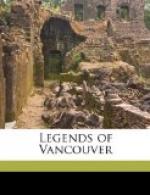“‘I am old,’ he called, in his sorrow and his trouble for his people. ’I am old, O Sagalie Tyee! Soon I shall die and go to the Happy Hunting Grounds of my fathers. Let not my strength die with me. Keep living for all time my courage, my bravery, my fearlessness. Keep them for my people that they may be strong enough to endure the white man’s rule. Keep my strength living for them; hide it so that the Paleface may never find or see it.’
“Then he came down from the summit of Grouse Mountain. Still chanting his medicine-songs, he entered his canoe and paddled through the colors of the setting sun far up the North Arm. When night fell he came to an island with misty shores of great grey rock; on its summit tall pines and firs encircled like a king’s crown. As he neared it he felt all his strength, his courage, his fearlessness, leaving him; he could see these things drift from him on to the island. They were as the clouds that rest on the mountains, grey-white and half transparent. Weak as a woman, he paddled back to the Indian village; he told them to go and search for ‘The Island,’ where they would find all his courage, his fearlessness and his strength, living, living forever. He slept then, but—in the morning he did not awake. Since then our young men and our old have searched for ‘The Island.’ It is there somewhere, up some lost channel, but we cannot find it. When we do, we will get back all the courage and bravery we had before the white man came, for the great medicine-man said those things never die—they live for one’s children and grandchildren.”
His voice ceased. My whole heart went out to him in his longing for the lost island. I thought of all the splendid courage I knew him to possess, so made answer: “But you say that the shadow of this island has fallen upon you; is it not so, tillicum?”
“Yes,” he said half mournfully. “But only the shadow.”
POINT GREY
“Have you ever sailed around Point Grey?” asked a young Squamish tillicum of mine who often comes to see me, to share a cup of tea and a taste of muck-a-muck that otherwise I should eat in solitude.
“No,” I admitted, I had not had that pleasure, for I did not know the uncertain waters of English Bay sufficiently well to venture about its headlands in my frail canoe.
“Some day, perhaps next summer, I’ll take you there in a sail-boat, and show you the big rock at the south-west of the Point. It is a strange rock; we Indian people call it Homolsom.”
“What an odd name!” I commented. “Is it a Squamish word?—it does not sound to me like one.”
“It is not altogether Squamish, but half Fraser River language. The Point was the dividing-line between the grounds and waters of the two tribes; so they agreed to make the name ‘Homolsom’ from the two languages.”




